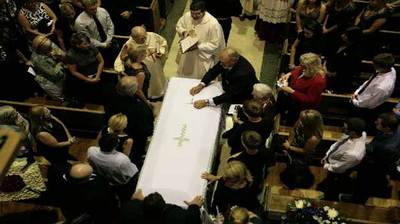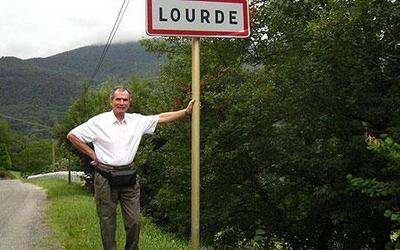 A priest who has a unique perspective on the question offers his own answer over at U.S. Catholic:
A priest who has a unique perspective on the question offers his own answer over at U.S. Catholic:
I was spending a leisurely minute planning my funeral the other day-not a savory task, but a prudent one since I have pancreatic cancer.
A friend gave me advice, sharing her plans. One car per person; she wants to tie up traffic. Lots of tears. Everyone wears black. No gladiolas, just expensive tropical gingers and flamboyant birds of paradise. Lots of speeches about how endearing and unforgettable she was. Not helpful. Especially the speeches part.
Like all priests, I’ve squirmed through enough dreadful funeral orations to be very cautious about my own planning. One speaker will be enough. In my case, it’s a dear friend at whose wedding I presided two decades ago; she has become my guide and my health care proxy on this journey of cancer. She is a parishioner, a member of my extended family now, and she’ll be able to speak from the heart, get a laugh or two out of everyone, say something about my faith journey, and sit down again.
It won’t be a eulogy, just some words about my faith journey after communion. In four minutes. Of course, the night before, at the vigil or wake, there will be a more raucous opportunity for general sharing on the topic of my life. I expect lots of tears, and an unseemly dose of laughter. That may take more than a few minutes to unfold.
The commonplace “eulogy” is not part of our Catholic tradition, and it doesn’t belong in a Catholic funeral Mass. Eulogy is Greek for “word of praise,” and we come to bury Caesar and not to praise the wretch, as Shakespeare says, because the only one we praise in liturgy is Christ.
A local undertaker recently adopted a new obituary style, writing that “A Mass in honor of Bootsie will be celebrated at Holy Martyrs Church tomorrow.” No, Bootsie will just have to be patient with us, since we celebrate Mass in honor of Christ.
You’ll want to read the rest.
Speaking for myself, I can appreciate his point of view. But I think a few moments of personal reflection at the end of mass can be a comfort to people — especially since, very often, the celebrant doesn’t know the deceased.
I have to say, though: the best funeral homilies often contain elements of a traditional eulogy, offering personal remembrances, along with thoughts on the Catholic understanding of death.
But those homilies are few and far between.
It’s worth noting, though, that the liturgical guidelines for funerals are both explicit — and ambiguous. “A brief homily based on the readings should always be given at the funeral liturgy, but never any kind of eulogy,” the directives note.
However, near the end of the mass, “The Order of Christian Funerals” notes: “A member or a friend of the family may speak in remembrance of the deceased before the final commendation begins,” which suggests that some comments (if it’s not a eulogy, then what is it?) are permitted — just not in place of a homily.
One thing I really dislike, though: multiple eulogies. One is plenty, thank you.

